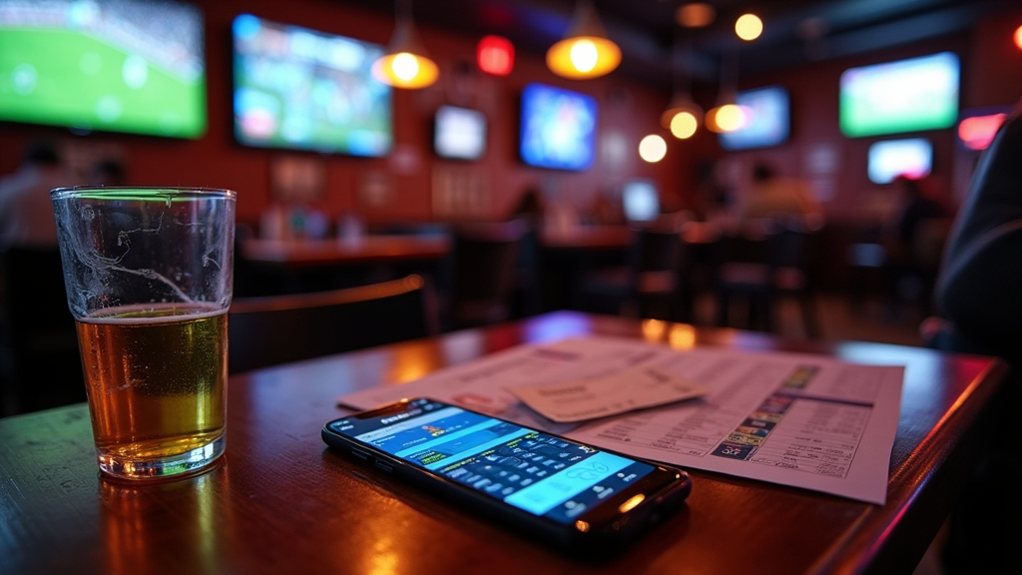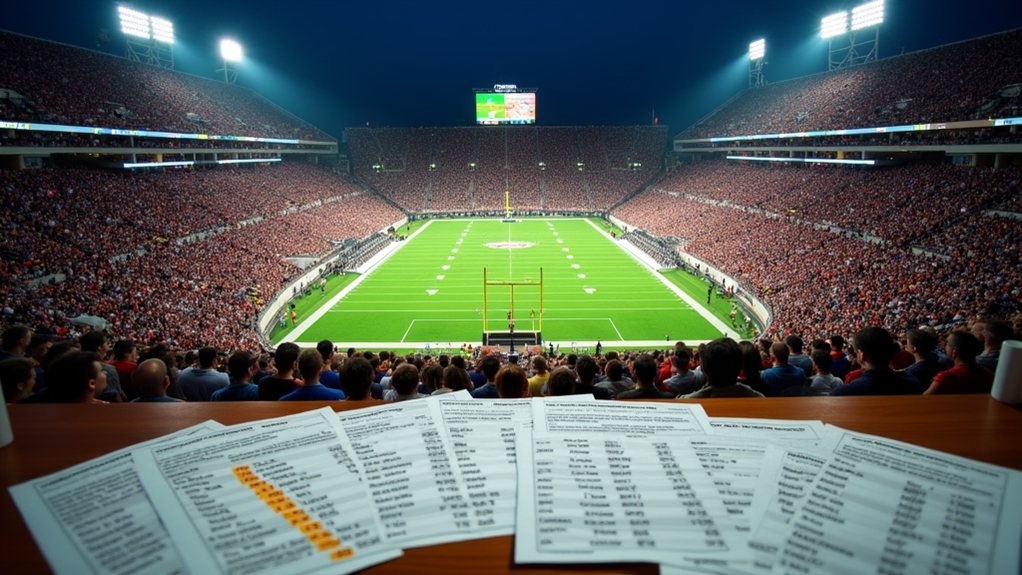The modern sports bettor defies old stereotypes. Today’s landscape shows a diverse betting community spanning income levels, ages, and genders. Men still dominate at 69%, but women now represent an impressive 40% of the market. High-income individuals participate heavily, with 44% earning six figures annually. Most bettors (84%) maintain team loyalty, suggesting emotional investment beyond financial stakes. Understanding these demographics helps sportsbooks deliver better experiences to customers. The gold standard of betting analysis reveals more about motivations in the following sections.
The Demographics and Preferences of Today’s Sports Bettors

Demographics reveal a clear portrait of today’s sports bettors in America. The market is mainly young males, with 69% being men and 39% under age 35. These bettors typically earn more, with 44% reporting annual incomes exceeding $100,000. Many practice responsible gambling habits by setting time and money limits before they begin betting sessions.
They’re also engaged fans – 84% follow specific teams closely and 67% attended a live sporting event in 2022. For many, the thrill of competition enhances their overall sports viewing experience, making games more engaging and personally meaningful.
Women are increasingly entering the betting landscape, now representing over 40% of active bettors. While men place larger wagers more frequently, both genders adopt mobile platforms for their betting activities.
Education levels among sports bettors trend higher than average, with 59.6% holding a bachelor’s degree or higher, with most preferring legal, regulated betting environments over offshore options.
Popular Sports and Platforms Driving the Betting Market

The landscape of sports betting has continued to evolve beyond who places bets to what they’re betting on.
Basketball leads American betting interests, capturing 53% of U.S. wagers, while soccer dominates globally. DraftKings has emerged as the gold standard platform, preferred by 57% of bettors.
The industry’s explosive growth is undeniable, with U.S. revenue reaching $14.3 billion in 2024, up from $11 billion in 2023.
This growth is fueled by expanding state legalization and digital innovation. Since the 2018 Supreme Court decision that allowed states to legalize sports wagering, Americans are expected to wager over $100 billion legally on sports in 2023. Major events like the Super Bowl drive significant betting volume, creating opportunities you don’t want to miss! Modern bettors increasingly rely on team performance statistics when making their wagering decisions. Beyond the Super Bowl, bettors are drawn to major events like the World Cup, Kentucky Derby, and March Madness due to their diverse betting markets.
Decision-Making Factors Behind Sports Wagering Choices

Why do sports bettors make the wagering choices they do? Their decisions stem from a complex mix of cognitive, emotional, and financial factors that shape their risk perception.
Most bettors (56%) seek entertainment, while others pursue financial gains or social recognition.
The gold standard in betting success comes from managing cognitive biases like confirmation bias and the gambler’s fallacy. Many bettors fall prey to the hot hand fallacy, mistaking random streaks for meaningful patterns that predict future outcomes. Successful bettors develop emotional intelligence, maintaining distance from the thrill while making calculated decisions.
Our fifth decade of research shows that proper bankroll management remains essential for long-term profitability.
Don’t miss out on developing the strategic decision-making that transforms mere chance into profitable insight!
FAQs
How Do Betting Habits Differ Internationally Compared to American Bettors?
While 80% of sports betting globally occurs online, international bettors prefer football (soccer), whereas Americans favor American football and basketball, showing distinct cultural preferences in sport selection and betting platforms.
What Psychological Factors Lead to Problem Gambling Among Sports Bettors?
Sport bettors develop gambling issues through cognitive biases, impulsivity, sensation-seeking behavior, anxiety, depression, and low self-esteem. Many chase losses while harboring erroneous beliefs about winning and control over outcomes.
How Has Mobile Technology Changed Sports Betting Behavior?
With 68% of sports bettors using smartphones, mobile technology has transformed betting behavior by enabling constant access, encouraging impulsive in-play wagers, and altering sports viewing into potential gambling opportunities anytime, anywhere.
What Responsible Gambling Measures Do Most Bettors Utilize?
Most bettors utilize setting deposit limits, self-exclusion programs, and time management tools. They also regularly monitor their betting history and maintain separate bankrolls for wagering to preserve financial freedom.
How Do Sports Leagues Benefit Financially From Betting Partnerships?
When the NFL partnered with DraftKings, revenues soared. Sports leagues secure substantial financial gains through sponsorship deals, exclusive betting content collaborations, increased viewership, merchandise sales, and projected collective earnings reaching $4.2 billion annually.









